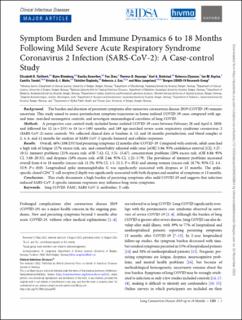Symptom burden and immune dynamics 6 to 18 months following mild SARS-CoV-2 infection -a case-control study
Fjelltveit, Elisabeth Berg; Blomberg, Bjørn; Kuwelker, Kanika; Zhou, Fan; Onyango, Therese Bredholt; Brokstad, Karl Albert; Elyanow, Rebecca G; Kaplan, Ian; Tøndel, Camilla; Mohn, Kristin Greve-Isdahl; Özgümüs, Türküler; Cox, Rebecca Jane; Langeland, Nina
Peer reviewed, Journal article
Published version
Permanent lenke
https://hdl.handle.net/11250/3043024Utgivelsesdato
2022Metadata
Vis full innførselSamlinger
Originalversjon
10.1093/cid/ciac655Sammendrag
Background
The burden and duration of persistent symptoms after nonsevere coronavirus disease 2019 (COVID-19) remains uncertain. This study aimed to assess postinfection symptom trajectories in home-isolated COVID-19 cases compared with age- and time- matched seronegative controls, and investigate immunological correlates of long COVID.
Methods
A prospective case-control study included home-isolated COVID-19 cases between February 28 and April 4, 2020, and followed for 12 (n = 233) to 18 (n = 149) months, and 189 age-matched severe acute respiratory syndrome coronavirus 2 (SARS-CoV-2)-naive controls. We collected clinical data at baseline, 6, 12, and 18 months postinfection, and blood samples at 2, 4, 6, and 12 months for analysis of SARS-CoV-2-specific humoral and cellular responses.
Results
Overall, 46% (108/233) had persisting symptoms 12 months after COVID-19. Compared with controls, adult cases had a high risk of fatigue (27% excess risk, sex, and comorbidity adjusted odds ratio [aOR] 5.86; 95% confidence interval [CI], 3.27–10.5), memory problems (21% excess risk; aOR 7.42; CI, 3.51–15.67), concentration problems (20% excess risk; aOR 8.88; 95% CI, 3.88–20.35), and dyspnea (10% excess risk; aOR 2.66; 95% CI, 1.22–5.79). The prevalence of memory problems increased overall from 6 to 18 months (excess risk 11.5%; 95% CI, 1.5–21.5; P = .024) and among women (excess risk 18.7%; 95% CI, 4.4–32.9; P = .010). Longitudinal spike immunoglobulin G was significantly associated with dyspnea at 12 months. The spike-specific clonal CD4+ T-cell receptor β depth was significantly associated with both dyspnea and number of symptoms at 12 months.
Conclusions
This study documents a high burden of persisting symptoms after mild COVID-19 and suggests that infection induced SARS-CoV-2-specific immune responses may influence long-term symptoms.

